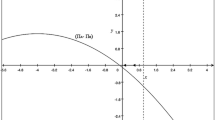Abstract
This paper describes an evolutionary game-theoretic learning model for dynamic congestion pricing in urban road networks, taking into account route choice stochasticity and reliability considerations, and the heterogeneity of users, in terms of their value of travel time and real-time information acquisition. The learning model represents the dynamic adjustments of users to travel cost changes which may take place in the day-to-day as well as the within-day timescales. The implementation into a simplified and a real urban road network signifies the important implications of modeling the dynamic and stochastic learning components of users’ behavior for accommodating the efficient deployment of congestion pricing schemes.
Similar content being viewed by others
References
Pigou, A. C. (1920). The economics of welfare. London, U.K.: Macmillan.
Knight, F. (1924). Some fallacies in the interpretation of social cost. The Quarterly Journal of Economics, 38, 582–606. doi:https://doi.org/10.2307/1884592.
Yang, H. (1999). Evaluating the benefits of a combined route guidance and road pricing system in a traffic network with recurrent congestion. Transportation, 26(3), 299–322. doi:https://doi.org/10.1023/A:1005129309812.
Walters, A. A. (1961). The theory and measurement of private and social cost of highway congestion. Econometrica, 29(4), 676–699. doi:https://doi.org/10.2307/1911814.
Vickrey, W. S. (1969). Congestion theory and transport investment. The American Economic Review, 59(2), 251–260.
Dafermos, S. C., & Sparrow, F. T. (1971). Optimal resource allocation and toll patterns in user-optimized transport networks. Journal of Transport Economics and Policy, 5(2), 184–200.
Yang, H., Meng, Q., & Lee, D. H. (2004). Trial-and-error implementation of marginal-cost pricing on networks in the absence of demand functions. Transportation Research Part B, 38(6), 477–493. doi:https://doi.org/10.1016/S0191-2615(03)00077-8.
Zhao, Y., & Kockelman, K. M. (2006). On-line marginal-cost pricing across networks: Incorporating heterogeneous users and stochastic equilibria. Transportation Research Part B, 40(5), 424–435. doi:https://doi.org/10.1016/j.trb.2005.08.001.
Henderson, J. V. (1974). Road congestion: A reconsideration of pricing theory. Journal of Urban Economics, 1(3), 346–365. doi:https://doi.org/10.1016/0094-1190(74)90012-6.
Arnott, R., De Palma, A., & Lindsey, R. (1990). Departure time and route choice for the morning commute. Transportation Research Part B, 24(3), 209–228. doi:https://doi.org/10.1016/0191-2615(90)90018-T.
Carey, M., & Srinivasan, A. (1993). Externalities, average and marginal costs, and tolls on congested networks with time-varying flows. Operations Research, 41(1), 217–231.
Huang, H. J., & Yang, H. (1996). Optimal variable road-use pricing on a congested network of parallel routes with elastic demand. In J. B. Lesort (Ed.), Proceedings of the 13th international symposium on transportation and traffic theory (pp. 479–500). Oxford: Elsevier.
Chow, A. H. F. (2007). Toward a general framework for dynamic road pricing. In B. Heydecker (Ed.), Proceedings of the 4th IMA international conference on mathematics in transport (pp. 245–257). Elsevier.
Wie, B. (2007). Dynamic Stackelberg equilibrium congestion pricing. Transportation Research Part C, 15(3), 154–174. doi:https://doi.org/10.1016/j.trc.2007.03.002.
Sandholm, W. H. (2002). Evolutionary implementation and congestion pricing. The Review of Economic Studies, 69(3), 667–689. doi:https://doi.org/10.1111/1467-937X.t01-1-00026.
Friesz, T. L., Bernstein, D., & Kydes, N. (2004). Dynamic congestion pricing in disequilibrium. Networks and Spatial Economics, 4(2), 181–202. doi:https://doi.org/10.1023/B:NETS.0000027772.43771.94.
De Palma, A., Kilani, M., & Lindsey, R. (2005). Congestion pricing on a road network: A study using the dynamic equilibrium simulator METROPOLIS. Transportation Research Part A, 39(7–9), 588–611.
Wie, B., & Tobin, R. L. (1998). Dynamic congestion pricing models for general traffic networks. Transportation Research Part B, 32(5), 313–327. doi:https://doi.org/10.1016/S0191-2615(97)00043-X.
Yang, F. (2008). Day-to-day dynamic optimal tolls with elastic demand. In Proceedings of the transportation research board 87th annual meeting. Washington, D.C.
Joksimovic, D., Bliemer, M. C. J., Bovy, P. H. L., & Verwater-Lukszo, Z. (2005). Dynamic road pricing for optimizing network performance with heterogeneous users. In IEEE proceedings of the international conference in networking, sensing and control. Tucson, AZ (pp. 407–412). Los Alamitos, CA, USA: IEEE Computer Society Press.
Maynard Smith, J. (1982). Evolution and the theory of games. Cambridge, UK: Cambridge University Press.
Mailath, G. J., & Samuelson, L. (2006). Repeated games and reputations. Long-run relationships. Oxford, U.K: Oxford University Press.
Mahmassani, H. S., & Jayakrishnan, R. (1991). System performance and user response under real-time information in a congested traffic corridor. Transportation Research Part A, 25(5), 293–307. doi:https://doi.org/10.1016/0191-2607(91)90145-G.
Yang, F. (2004). An evolutionary game theory approach to the day-to-day traffic dynamics. Unpublished Ph.D. dissertation, Civil and Environmental Engineering Department, University of Wisconsin-Madison, Madison, WI.
Dimitriou, L., Tsekeris, T., & Stathopoulos, A. (2007). Evolutionary game-theoretic model for performance reliability assessment of road networks. In Proceedings of the 3rd international symposium on transportation network reliability. The Hague, Netherlands.
Friesz, T. L., Kwon, C., & Mookherjee, R. (2007). A computable theory of dynamic congestion pricing. In R. E. Allsop, M. G. H. Bell, & B. G. Heydecker (Eds.), Proceedings of the 17th international symposium on transportation and traffic theory (pp. 1–26). Amsterdam: Elsevier.
Author information
Authors and Affiliations
Corresponding author
Rights and permissions
About this article
Cite this article
Dimitriou, L., Tsekeris, T. Evolutionary game-theoretic model for dynamic congestion pricing in multi-class traffic networks. Netnomics 10, 103–121 (2009). https://doi.org/10.1007/s11066-008-9027-9
Received:
Accepted:
Published:
Issue Date:
DOI: https://doi.org/10.1007/s11066-008-9027-9




